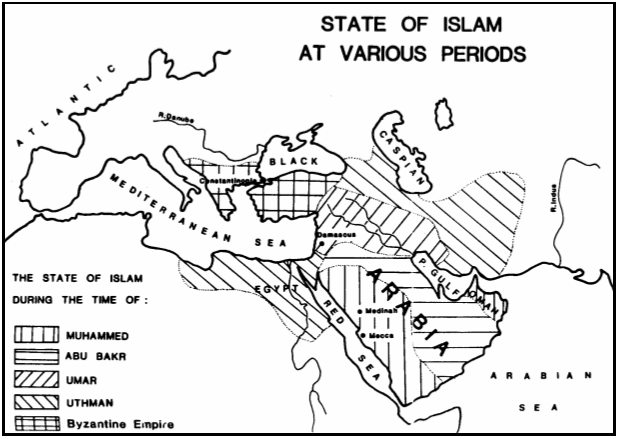At the death of the Holy Prophet, the Muslims lost not only their prophet but also their spiritual, religious and political leader. The Holy Prophet had not designated any successor during his own lifetime and the young Muslim community could not possibly survive without one. Someone had to lead the community and provide spiritual, social, legal and political direction. A leader, therefore, had to be selected who would not only be acceptable to the people but also worthy of the Prophet’s ideals and objectives. The choice of the Muslims fell on Hadhrat Abu Bakr who was then elected as the first Khalifah or Successor of the Holy Prophet. This election or nomination of leaders in the Muslim community grew into an institution called the Khilafat or Caliphate.
Like many other Islamic institutions, the system of Khilafat changed and evolved over a period of time. Not all Khalifahs were elected in exactly the same manner, nor were the political conditions identical at the demise of each Khalifah that would merit the adoption of one fixed system of election.
As long as the Holy Prophet was alive, he kept in check the tribal rivalries that existed among the Arabs. After his death, these rivalries came out in the open and played a significant role in manipulating the power vested in the office of the Khilafat.
The system of Khilafat, in one form or another, lasted some 626 years after the death of the Holy Prophet. During this period five distinct Caliphates existed among the Muslims, all belonging to the House of Quraish. These were:
| 1. | The Pious Caliphate | 632-661 AD |
| 2. | The Umayyad Caliphate of Damascus | 661-750 AD |
| 3. | The Abbasid Caliphate of Baghdad | 750-1258 AD |
| 4. | The Umayyad Caliphate of Spain | 929-1031 AD |
| 5. | The Fatimid Caliphate of Egypt | 909-1171 AD |
THE PIOUS CALIPHATE OF MEDINA (632-661 AD)
| Name of Khalifa | Dates A.D. | Years | |
| 1. | Abu Bakr | 632 – 634 A.D. | 2 Years |
| 2. | Umar | 634 – 644 A.D. | 10 Years |
| 3. | Uthman | 644 – 656 A.D. | 12 Years |
| 4. | Ali | 656 – 661 A.D. | 5 Years |
After the death of the Holy Prophet, the period of the four successors, Abu Bakr, Umar, Uthman and Ali, is known as the Pious Caliphate. This was the most critical period for the State Islam. The transition from the absolute authority of the Messenger of God to the authority of an elected successor was not easy for the Muslims.
The Pious Caliphate, which lasted 29 years, was notable for the remarkable expansion of the Islamic State and the democratic election of the Khalifahs. However, this Caliphate was also riddled with internal dissension, apostasy and factional strife.
The most significant feature of the Pious Caliphate was its system of election. All the four Khalifahs were elected in one way or another. In the case of other dynastic Caliphates that followed, this system of election was replaced in favour of direct nomination of family members.
The Pious Caliphate came to its end after the demise of the fourth Khalifa, Hadhrat Ali, however all the rulers who came afterwards continued to use the title of a Khalifa or Caliph for themselves. The Khalifahs in the Pious Caliphate were the heads of State with no constitutional or political check on their authority. But this did not mean that they could do whatever they wanted. The Khalifahs had to exercise their authority according to the commands and principles of the Holy Qur’an and the Hadith. In the later Caliphates, as we will see, this restraint on the Khalifahs was removed and they literally did whatever they pleased.
Another notable feature of the Pious Caliphate was the Shura or the Consultative Body which advised the Khalifah on all important matters. During the later Caliphates, this Shura was dissolved and the decision making rested solely with the Khalifah himself.
During the period of the Pious Caliphate, a Public Treasury was set up to receive Zakat and other taxes and to meet the expenditures of general administration, warfare and social programs. In the later Caliphates, this Public Treasury became the personal property of the Khalifahs.
The other notable aspect of the Pious Caliphate was the extreme simplicity with which the Khalifahs led their lives. They lived in ordinary homes, did their own household work, and their doors were always open to any complainant. On the other hand, the Khalifahs in the later Caliphates lived like kings in their lofty castles, enjoying the worldly pleasures and were inaccessible to the common public.
It was indeed a great blessing for Islam that the immediate Successors of the Holy Prophet were men of great wisdom, courage and saintly character. Although they were heads of the Islamic State, supreme commanders of the Muslim armies and chief justices of the judicial system, yet they led a life completely free from any pomp and show. Many a times visitors from distant areas would come to the Khalifah’s court and ask the question, “Where is the Khalifah?”, while all the time the Khalifah sat in front of them dressed in ordinary clothes, indistinguishable from the common people.
To the Pious Khalifahs their office was a sacred trust and a responsibility to be discharged with great honesty, diligence and perseverance. They paid no heed to the honour and prestige vested in their office and devoted their lives whole-heartedly to thebetterment of their subjects and to spreading the message of Islam.

HADHRAT ABU BAKR (632—634 AD)
Hadhrat Abu Bakr, may Allah be pleased with him, was nearly the same age as the Holy Prophet, belonged to the tribe of Quraish and his genealogy unites his forefathers with that of the Holy Prophet’s.
He was elected after Hadhrat Umar, may Allah be pleased with him, proposed his name and everyone present accepted and swore allegiance to him. He took office of Khilafat at the most crucial time in Islamic history when the rising of false prophets, rebellion, disunity among the Muslims, and political developments outside Arabia, all threatened the new born state of Islam. He crushed the influence of the false prophets, brought unity among the Muslims and put an end to rebellion at home and aboard.
HADHRAT UMAR BIN KHATTAB (634–644 AD)
Just before Hadhrat Abu Bakr, may Allah be pleased with him, passed away, he consulted some prominent Muslims regarding a suitable successor. Everyone suggested Umar’s name.
Hadhrat Umar, may Allah be pleased with him, not only conquered a vast area during his ten year Khilafat, but also implemented a great system of administration. In the year 644 A.D., he was fatally stabbed by a Persian slave while he was saying his prayer in the Mosque.
HADHRAT UTHMAN BIN AFFAN (644—656 AD)
When Hadhrat Umar, may Allah be pleased with him, was on his death bed, he appointed a council to elect the next successor. Hadhrat Uthman bin Affan, may Allah be pleased with him, was elected by that council.
During the first half of his Khilafat, Hadhrat Uthman, may Allah be pleased with him, ruled the state with good reputation and was well liked by the people. He was responsible for standardising the Holy Qur’an and the expansion of Islam continued. But slowly mischief makers started to raise dissention and a number of charges were laid against Hadhrat Uthman, may Allah be pleased with him. Although Hadhrat Uthman, may Allah be pleased with him, gave numerous explanations for his misunderstood conduct, the wave of dissent and revolt against him started to spread throughout the state. At the same time, the age old jealousy and rivalry between the Hashimites and the Umayyads started to re-surface. An important reason for the rapidly deteriorating political situation was also the extreme simplicity and kindness of Hadhrat Uthman’s character. Hadhrat Uthman, may Allah be pleased with him, often dealt too kindly with the criminals and the rebels. At last, the various parties who wanted to depose Hadhrat Uthman, may Allah be pleased with him, entered Medina. Hadhrat Uthman, may Allah be pleased with him, refused to fight and shed the blood of fellow Muslims. The rebels surrounded his house and while he was reading the Holy Qur’an, assassinated him.
HADHRAT ALI BIN ABU TALIB (656—661 AD)
With the death of Hadhrat Uthman, may Allah be pleased with him, a state of complete disorder and anarchy ruled in the city of Medina. After five days of political wrangling, Ibn Saba, leader of the Egyptian rebel group supported the cause of Hadhrat Ali, may Allah be pleased with him, on the grounds that he was the rightful Khalifah in whose favour the Holy Prophet had made a will. Six days after the death of Hadhrat Uthman, may Allah be pleased with him, Hadhrat Ali, may Allah be pleased with him, was chosen and the public swore allegiance at his hand one by one.
Soon after his election, Hadhrat Ali, may Allah be pleased with him, moved the capital of the Muslim State from Medina to Kufa in Iraq. Immediately after the election of Hadhrat Ali, may Allah be pleased with him, a cry of revenge arose throughout Arabia for the blood of the murdered Khalifa. Realising the political sensitivity of the Islamic State, Hadhrat Ali, may Allah be pleased with him, did not consider it proper to take any immediate action. He told the public that justice would be carried out in due course. To further pacify the rebels, Hadhrat Ali, may Allah be pleased with him, took steps to change all the provincial governors and asked them to step down. All except Muawiah complied. The refusal by Muawiah, the Governor of Syria, to obey the Khalifah’s orders set the stage for an eventual armed conflict between the two. Before that though, Hadhrat Ali, may Allah be pleased with him, had to fight a battle against Hadhrat Talha, Hadhrat Zubair and Hadhrat Ayesha, the wife of the Holy Prophet. The three marched towards Basra at the head of a small army. Both Hadhrat Talha and Hadhrat Zubair were killed and the army under the command of Hadhrat Ayesha was defeated. It was the first time that Muslims fought against Muslims!
When Muawiah continued to refuse to obey Hadhrat Ali, may Allah be pleased with him, he was given no choice but to declare war against Muawiah. The armies fought and both sides suffered heavy causalities. Finally, it was decided that each side would choose an arbitrator to solve the conflict. The decision called for both Ali and Muawiah to give up their claims to Khilafat and that a third person should be elected as Khilafat. A decision which Hadhrat Ali, may Allah be pleased with him, could not accept. Rebellions broke out all over the land and the political stability of the Islamic State started to deteriorate rapidly. A group known as the “Kharijites” started to create havoc. Hadhrat Ali finally had to negotiate a treaty with Muawiah, in the interest of Islam. Under this agreement, Muawiah retained control of Syria and Egypt whilst the rest of the empire remained under Hadhrat Ali’s rule. The “Kharijites” were not happy with this peaceful development and decided to kill Hadhrat Ali, may Allah be pleased with him, at Kufa, Muawiah in Damascus and Amr bin Aas in Fustat, all on the same night. Amr escaped, Muawiah received minor injuries, but Hadhrat Ali, may Allah be pleased with him, was killed.

